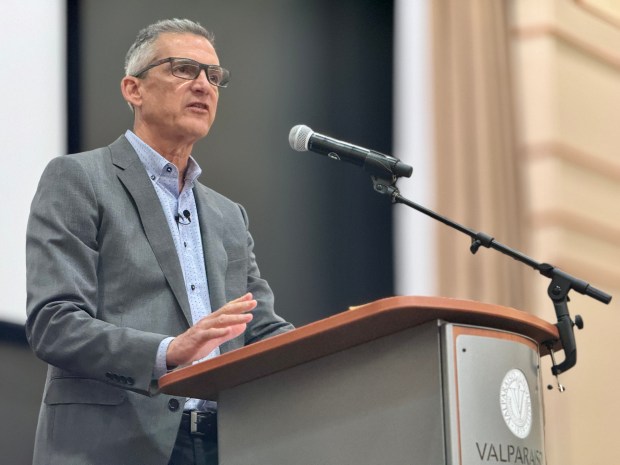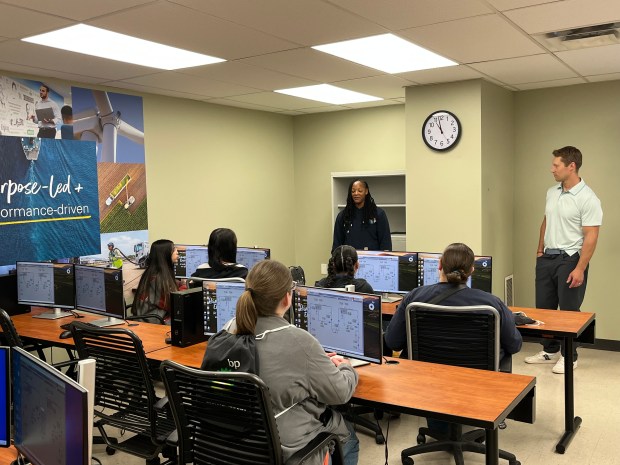Valparaiso Mayor Jon Costas preached the virtues of civility to kick off an event aimed at bringing the community together.
“Civility is to local government, is like what oil is to your car engine,” he said. “It reduces friction and allows the various parts to function together in harmony in order to propel the car forward.”
Thursday’s sold-out Valparaiso Community Conference at Valparaiso University brought people together to discuss making a difference in their community.
“The more involved you get in your community, the more likely you are to stay,” Community Engagement Director Maggie Clifton said.
“We see your attendance as a gift to the city and its future,” Costas told attendees.
At the national and state level, ideology is more involved in the issues than in local government, which addresses practical matters that more directly affect residents’ lives. “Public safety, ambulance response times, vibrant parks, clean water, roads and streets, planning economic development, housing, drainage and sewer systems are many of the functions of local government that touch your life many times each day,” Costas said.
Costas listed 10 trends he believes have contributed to the decrease in civility and civic trust and make governing at the local level more difficult.
1. Cable news “that exclusively caters to a specific audience and promotes a predetermined narrative rather than balanced news.”
2. Social media platforms that promote misinformation, foment distrust and inflame hostility.
3. National political messaging that surgically divide people to win elections at any cost.
4. Smartphone isolation. “We need to scroll less and talk more,” he said.
5. Digital addiction, the tsunami of information and amusement overload.
6. Reduced confidence and respect for virtually all major institutions.
7. Reduced engagement in civic and faith-based institutions.
8. Lack of local newspapers that provide in-depth local coverage.
9. Algorithims “that trap us in the silos of our own choosing.”
10. Lack of shared experiences.
“Fifty years ago, the entire nation would watch Carol Burnett, Ed Sullivan, learn the news from Walter Cronkite and then watch Johnny Carson interview interesting guests without ever delving into politics,” Costas said. “Shared experiences create a kind of glue that even if you don’t love the smell of it, it still holds things together.”
“Regardless of your political bent, I think we can all agree that national politics is a disruptive and combative arena that has produced much anxiety, intense feelings and division in the general public,” he said. That, in turn, makes it harder for local government leaders “to cut through the noise and address the practical problems that cannot be solved by sound bites and demeaning rhetoric.”
Rather than just bemoan the problem, there are ways to address it, he said. “We must focus on what we can control, our own conduct and attitudes.”
‘We can all improve our civil conduct toward one another, and if we all work on that, we will be a more harmonious, productive and peaceful local community,” Costas said.
Lack of civility can disrupt public meetings, infect the fact-finding process and encourage people to have a low view of institutions that exist for their common good, he said.
“When we degrade others to get our point across, or knowingly share slander, or engender fear to manipulate a decisionmaker, we hurt ourselves, our community and our nation’s future,” Costas said.
Intellectual humility allows people to explore ideas constructively, perhaps even changing viewpoints, without attacking others. “It allows us to hold our core beliefs tightly but our many opinions loosely,” he said.
Costas urged attendees to take the cable news rage machines to understand why they’re saying the things they do – to get people to click more and rage more. Watch less often and watch more than one network, taking inherent and obvious biases into account.
Rethink your social media presence, leading by example. “It’s easy to be a keyboard assassin but so hard to sit across from another and have a civil exchange of differing ideas,” he said.
Cultivate friendships with people from the opposite party or the other side of an issue. “Invariably, when you get to know a person better, you discover many shared beliefs and the things you disagree on tend to fade into the background,” he said.
Beware of algorithms. “They are designed to feed you more of what you want or believe. They lock you into a silo and stunt your personal growth,” Costas said.
Go to church or synagogue more often, or seek resources to “exercise your serving muscle,” he urged.
Subscribe to balanced news sources. Subscribe to your local newspaper and encourage local journalism, he said.
Encourage your local officials. The most effective local leaders aren’t in it for the money, he said.
Read a book that challenges you to hold your opinions loosely while not letting go of core beliefs, Costas urged.
Judge your own motives and actions fiercely. “You cannot change others, but you can change yourself,” he said.
‘When we want to get rid of something, it’s trash and we take it outside and throw it in the trash can. That’s how we should feel about our darker temptations,” Costas said.
Doug Ross is a freelance reporter for the Post-Tribune.




